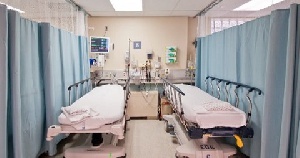Ghana has introduced a new phraseology into medical practice - the ‘no bed’ syndrome. The syndrome does not exist anywhere, not in any textbook of medicine or nursing so where from this that has resulted in the setting up of committees of the Ghana Health Service and Parliament? What have beds got to do with anything?
Elsewhere, there is a reduction in bed numbers and an efficient use of beds in clinics and hospitals. Professionalism is what has suffered in Ghana; doctors and nurses choosing not to be professionals holding the high moral ground and doing unto others even more than they would have done for them.
The recent event is not new. Many have died prematurely because doctors and or nurses have chosen to deny sick people of their expertise but family members chose not to make an issue about it. Our penchant to give it all to God is a phenomenon that does not lend anything to proper scrutiny. When Prof. Atta Mills died and I asked that there must be an audit to find out where we went wrong so it does not happen again, people felt I was apportioning blame. The only reason why fire drills are held periodically is to ensure that the system functions without hitches. Unfortunately, we in Ghana will trotter on, hoping that nothing ever happens like that again.
Handling medical emergencies
A medical emergency is a critical situation that merits immediate attention and all hands must be on deck. In the United Kingdom (UK), every hospital has a cardiac arrest team that responds as soon as there is an arrest call. You will see members of the team running to where the arrest is as if their life depends on it; indeed, their professional life depends on it. There is no way doctors and nurses associated with this saga can keep their jobs.
Anywhere else they will go through different queries - hospital, district health management, regional health management before the Ghana Health Service (GHS) headquarters and then the Ministry of Health. The Medical and Dental Council and the Nurses and Midwives Council, the regulatory agencies, will look at malpractice and negligence issues.
In Ghana, it happens on a daily basis and no hospital management does anything about it and so it has become part and parcel of their practice. One does not need a bed to attend to an emergency. The patient could have been attended to on the floor by the car before being put on a stretcher to the emergency room, stabilised and then ideally the hospital rings around for a bed in any adjacent hospital and send patient on in an appropriate means of transport—an ambulance equipped to maintain life, not the relations driving patient all over the place.
Efficiency on bed utilisation
Bed management is poor in Ghana. It is so important that there must be a health service administrator in charge liaising with the chief nursing officer's office to plot at any given time what is happening with all beds across the different parts of a hospital. Patients must also be encouraged to lift themselves up and walk so they can go home early.
A hospital environment is not always the best place to recuperate. Once the initial problem has been resolved and medications offered, the best place is home. Efficiency on bed utilisation is the difference between a successful hospital and an unsuccessful one. We need to learn and practise bed efficiency throughout our health service. Let me state for emphasis that many beds do not make a successful health service.
These events are symptoms of a poor health service. Let us not deceive ourselves. The health service is poor on all counts of health systems strengthening: finance, drugs, medical technologies, medical information, human resources, service delivery and also research that underpins everything and community participation.
We need to up our game in all the areas if the health service is to maintain the lives of Ghanaians. If Ghanaian lives matter, to borrow the US cliché- black lives matter, then the elected leaders must abandon using other country's health service and use ours so they can feel the strains and help fix them.
A parliamentary committee cannot and will not fix the problem. If we must add to medical knowledge and practice, let it be useful and commendable.
Opinions of Sunday, 17 June 2018
Columnist: Prof. Agyeman Badu Akosa















